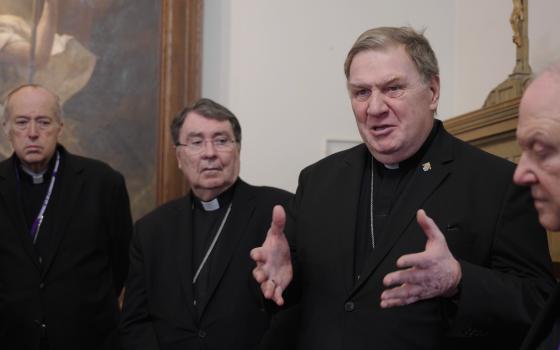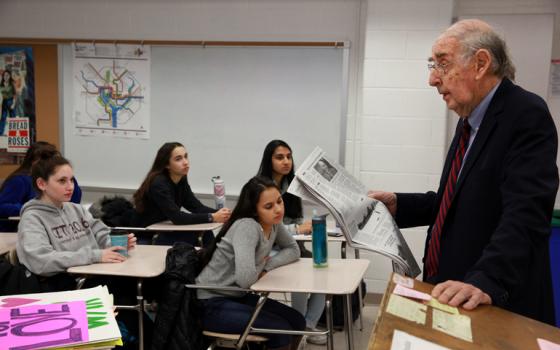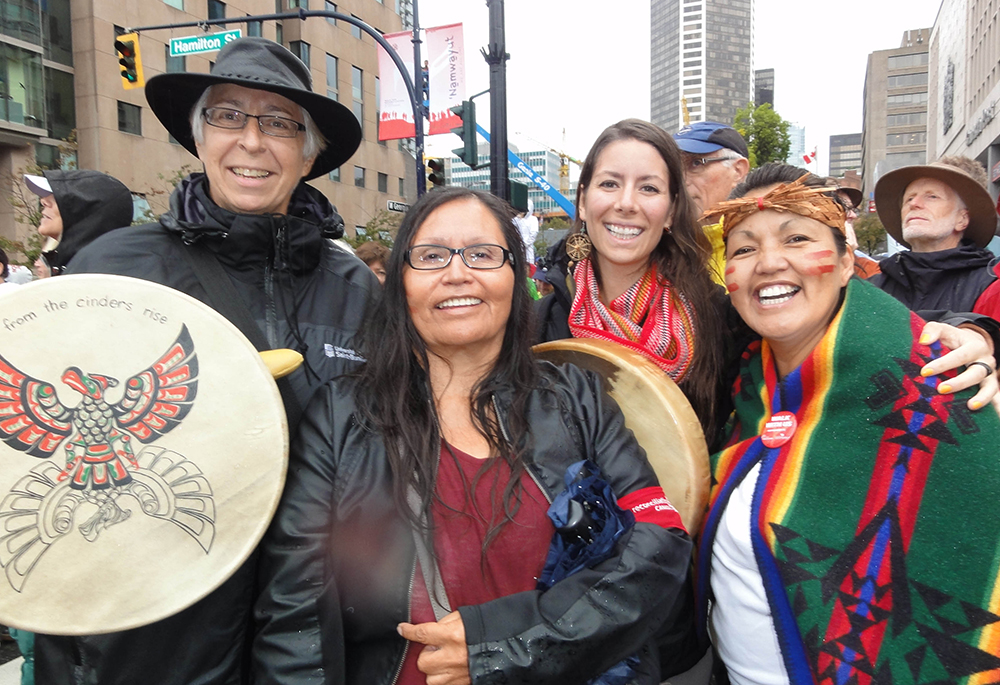
Sr. Norma McDonald, left, participates in a walk during the Truth and Reconciliation Committee in Vancouver 2013 with Nora Martin (Tla-o-qui-aht First Nation), Janelle Delorme (a réconciliACTION participant 2013) and Margaret Eaton (Tla-o-qui-aht First Nation). (Courtesy of Sr. Norma McDonald)
During the six years he attended the Tobique Indian Day School, in Canada's eastern province of New Brunswick, David Perley lived in fear of being hit by the Sisters who taught there. That's what would happen when students got caught speaking Wolastoqey, the only language he knew when he started grade one.
On the first day of school, "I thought, 'Maybe this is going to be fun for us children,' but it took me all of two hours to realize that this is a place where you get strapped, a place where you're told every single day that who you are isn't worthy," said Perley, a former chief of the Maliseet Nation at Tobique. "It was a constant reminder that to be Indian was to be savage."
Sixty-eight years later, Perley and his wife Imelda are celebrated educators, who dedicated their lives to reviving the Wolastoqey language and culture and to giving Indigenous peoples support and visibility in the province. And the trauma of day-school students, who went home at night but suffered similar abuse to residential-school students, was recognized in a 2019 class-action settlement.
Perley shared some of his childhood experience last October in front of delegates from Atlantic Canada's religious female congregations working on social justice. Among them was Sr. Mary Beth McCurdy, the leader of the Sisters of Charity of the Immaculate Conception, the congregation that taught at the school he dreaded. It wasn't new to her. She had become aware of the story through his academic work, and the two got to know each other through a reconciliation circle. They consider each other allies.
"David is so honest about what he felt and what our treatment did to his life — and yet he has forgiven us," McCurdy, who never taught at the school, said in an interview. She hopes to see Tobique one day: "I want to go to the land and pray and make amends."
McCurdy's path to healing and reconciliation started decades ago, when she lived in Edmonton and trained to be a community counselor in addiction at the Nechi Institute, where traditional Indigenous culture is a key part of the curriculum. The circle she and the Perleys joined during the pandemic followed an 11-chapter guide published by the Jesuits of Canada, "Listening to Indigenous Voices," which was inspired by the recommendations of the Truth and Reconciliation Commission. The experience was so rich that the group is done with the book, but not with each other, McCurdy joked.
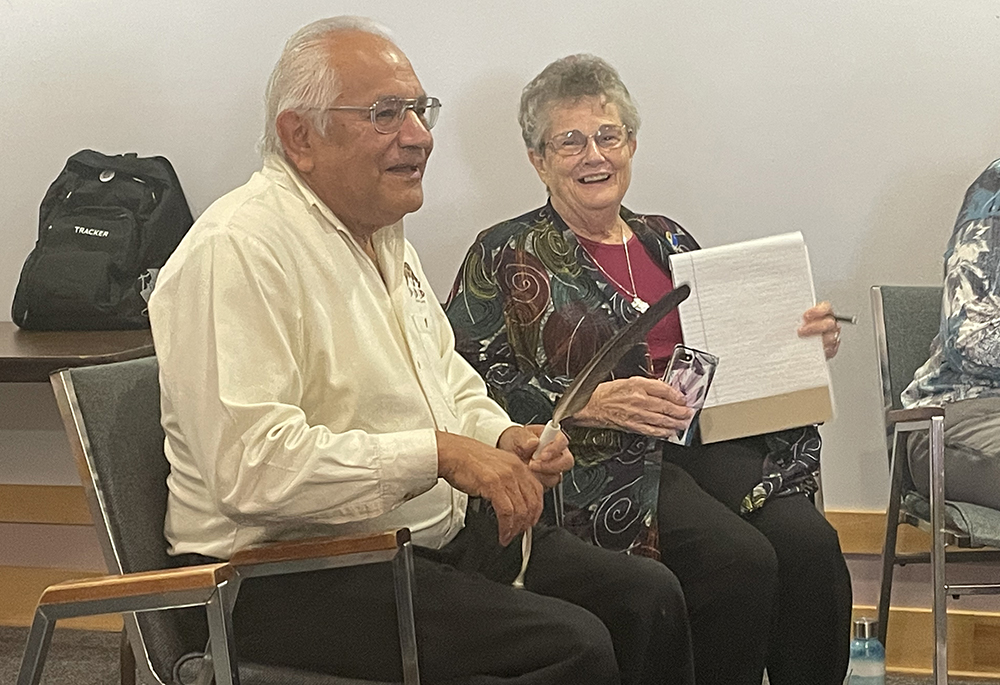
Sr. Mary Beth McCurdy, leader of the Sisters of Charity of the Immaculate Conception, St. John, New Brunswick, with David Perley, of the Tobique First Nation, former director of the Mi'kmaq-Wolastoqey Centre at the University of New Brunswick (Courtesy of Sabrina Di Matteo/Canadian Religious Conference)
Educating Catholics
Across Canada, Sisters like McCurdy are trying to rebuild a relationship with Canada's Indigenous peoples, acknowledging the role the Catholic Church played in the government's plans to forcibly assimilate First Nations, Inuit and Métis children into the dominant culture. Their efforts vary greatly in scope and visibility, depending on their background, journey and age. In Canada, 85% of consecrated persons (mostly women) were over 75 years old as of 2020, according to the Canadian Religious Conference, a network of some 240 congregations.
In contrast with the young people of Tobique, who are rejecting the Catholic Church and embracing ancestral practices, Perley is comfortable combining the two. But he sees work left to educate Catholics about Indigenous worldviews and history, including centuries-old treaties with the British crown that were based on harmony and mutual understanding, he said.
"We need to bring back that kind of relationship so that the church will be a place where our culture is respected, and our practice as well," he said. "When we have a sweet grass ceremony, that doesn't mean we try to convert them into First Nation spirituality — they're complementary."
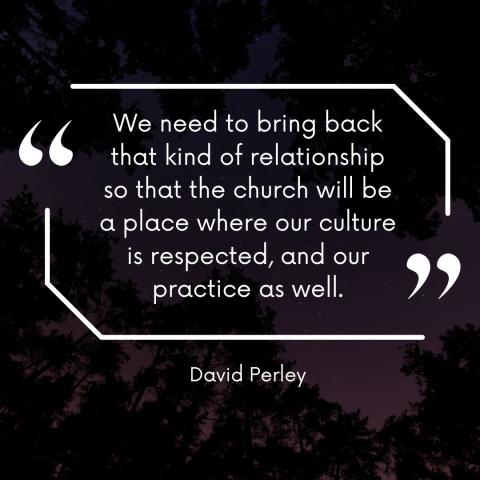
Learning the history between Indigenous and non-Indigenous people is one of six steps of "reconciliACTION" recommended by the National Centre for Truth and Reconciliation. Circles of discussion are a way to raise awareness. Another is the "blanket exercise," a 90-minute or so workshop designed by KAIROS Canada, an ecumenical program that advocates for social justice.
Sisters from several congregations have trained as facilitators for the program, which helps open the eyes of participants on the way Canadian history was experienced by the Indigenous, said Sr. Priscilla Solomon. The "blanket exercise" has been offered several times to her congregation of St. Joseph of Sault Ste. Marie in Ontario, she said.
The blankets represent the land. At first, there are enough in the room for a group of people to move easily from one to the other. As different historical events unfold, including the arrival of European settlers and the rules they declare, blankets get removed.
"In the end, you have very little land, you have Indigenous people crowded into very small spaces," said Solomon, who is a member of the Anishinabek Nation.
Building relationships
Sisters have also helped educate younger generations by giving them a chance to spend time with, and learn from, Indigenous communities.
Sr. Renelle Lasalle of Les Soeurs des Saints Coeurs de Jésus et de Marie (The Sisters of the Holy Hearts of Jesus and Mary) planned such an encounter in 2007, when she accompanied a youth group to spend a memorable week in the woods with residents of Kitcisakik, in Quebec. That was the start of life-changing relationships for her too. Three years later, she moved to the region as a missionary, where she lived for a decade and organized many more trips for teenagers.
A thousand miles west, at the Université de Saint-Boniface in Manitoba, Sr. Norma McDonald put her own program together. She had been taking students on solidarity trips from Mexico to Mali when she decided, in 2011, that it was time to open their eyes about social injustices in their own backyard.
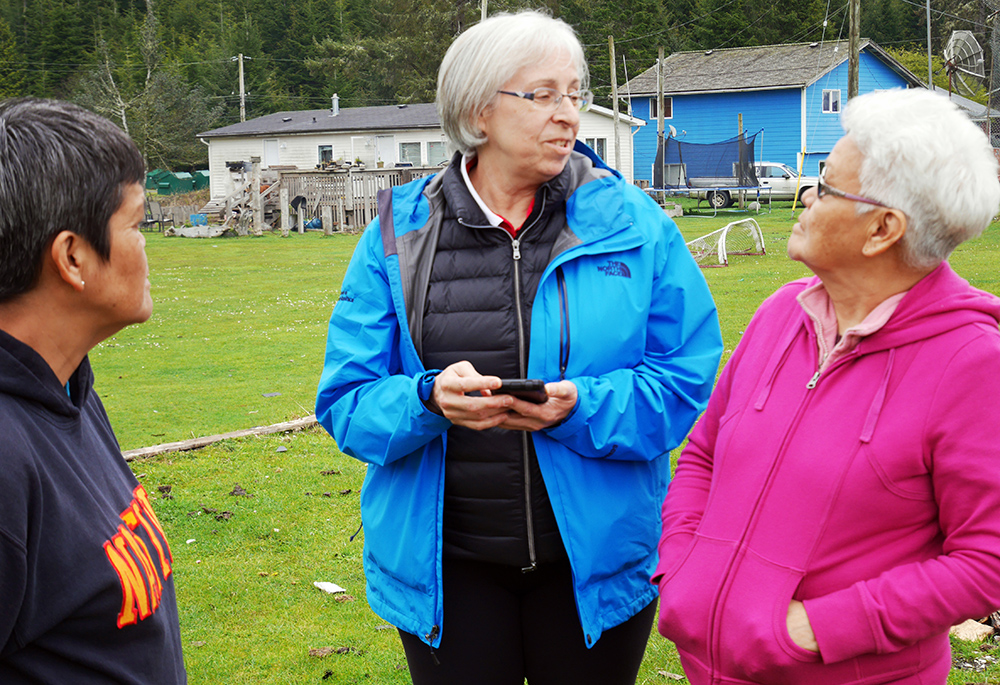
Sr. Norma McDonald, center, visits Opitsaht (across from Tofino) with friends Darlene Charlie and Rose Tom. (Courtesy of Sr. Norma McDonald)
"I did not want us to visit somewhere in Canada our First Nation community with our big boots on as colonizers," she said. "For me that meant we had to learn to listen and to learn how to create a relationship that's based on caring and love and connection."
She came across Returning to Spirit, or RTS, an organization that offers in-depth reconciliation workshops and was co-founded by a Sister of St Ann. Indigenous and non-Indigenous people first attend a four-day session as separate groups, where they discover their biases and judgements. During a second, five-day session (which takes place at a different time), the two groups get a chance to talk.
McDonald, who is now on the board of Returning to Spirit, and her students did the first workshop in November 2012. Three months later, seven First Nation women from British Columbia came to Manitoba to participate in the second workshop with them and discover the local Francophone and Métis culture. The women invited them to visit their communities a few months later.
The experience was "transformational" for the students and teachers, said McDonald, who also included other events, such as ceremonies and teachings from Indigenous elders, in her "réconciliACTION" program that ran until 2015.
Different kinds of support
While nothing replaces in-person experiences, age is becoming an increasingly insurmountable hurdle for Sisters who want to get actively involved in reconciliation efforts. As an example, McDonald, who is 69, is among the youngest of her congregation in Canada.
As a result, more contributions from Sisters in the country today tend to be of a financial nature, a different but meaningful way to take part because "it represents all of the years that we've been in mission," said McDonald.
"You will see many of the congregations investing in projects that do promote healing and reconciliation," McDonald added. "Most of us are looking towards Indigenous-led endeavors, to help the Native people really take the place they should have."
One such project is the Clan Mothers Healing Village and Knowledge Centre, which supports people who have suffered from sexual abuse and exploitation, and sex trafficking. Envisioned by Indigenous grandmothers, the matrilineal-focused village is being built on 130 acres of land outside of Winnipeg that was acquired and donated by Réseau Compassion Network, a Catholic sponsor of health and social services organizations, as well as 11 congregations of sisters.
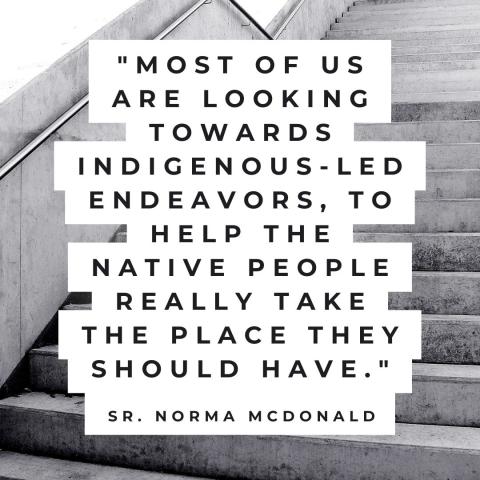
"This act began a relationship between Women of Spirit, Catholic and Indigenous, committed to an honest and open dialogue about the past, present and future with the goal of reconciliation," the Village said on its website. "We acknowledge that this process will take time and will not always be comfortable."
Broadening and easing access to congregations' archives is also a step toward reconciliation. The Sisters of St Ann, for instance, last year gave the Royal British Columbia Museum full responsibility for their records and funded a dedicated archivist position there.
Sisters don't necessarily communicate much about their contributions and their beneficiaries, however. McCurdy's congregation donated funds to help create a "Healing Garden" that will integrate Indigenous knowledge and be cared for by Indigenous people as part of a new Health and Social Innovation Centre at the University of New Brunswick in St. John.
That helps explain why the religious conference itself doesn't have an exhaustive view of initiatives across Canada. It is planning to survey congregations to build one, said Sabrina Di Matteo, a former executive assistant at the organization.
Advertisement
National advocacy
Most recently, and perhaps more visibly, Sisters' involvement has branched out into national advocacy. Last year, some 20 congregations, male and female, joined forces to fund a full-time position in Ottawa, the nation's capital, to carry their voice on climate change, social justice, and reconciliation.
Their newly formed organization, the Office of Religious Congregations for Integral Ecology, or ORCIE, follows bills of interest in Parliament to determine where and how it can best intervene, said Genevieve Gallant, its executive director.
One example is Bill C-29, which would create an independent, permanent and Indigenous-led national council of reconciliation to keep the government accountable. Gallant said tracking the legislation helped ORCIE pay attention to a broader group of Indigenous communities and understand their priorities.
"It was a great education," she said.
The group also signed a statement released on National Indigenous Peoples Day, pushing for action on implementing the United Nations Declaration on the Rights of Indigenous Peoples Act, which Canada adopted in 2021.
While many congregations have staff focusing on social justice and peace, they lack the time to do such work because they are busy engaging, either locally or internally, she explained.
The organization "came out of those — mostly Sisters — who are doing that justice work, wanting to have somewhere, someone, really focused on advocacy," Gallant said. "The trick is to have a local connection and to be advocating at the highest possible level."
Such a project is a way to depart from the colonial past and to be in a different kind of relationship with Indigenous peoples, said Sr. Sheila Smith, whose congregation, Society of the Sacred Heart, is part of ORCIE.
"The role of the church, the role of non-Indigenous Canadians, because it has been so dominant, is to really pull back and listen and to be in solidarity."






